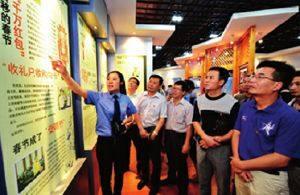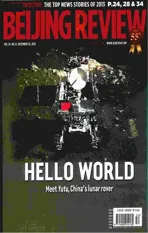Asset Disclosures
2013-04-29ByYinPumin
By Yin Pumin
Disclosure of officials private assets can enhance transparency and help fight corruption, but has been stalled for a long time in China. Now, change may be coming in the form of an unprecedented breakthrough.
Newly promoted officials will be required to publicize information including their familiesassets, their spouses and childrens jobs, their incomes, as well as entry and exit records, according Li Xueqin, an anti-graft official of the Communist Party of China (CPC).
Li, head of the Research Division of the CPC Central Commission for Discipline Inspection(CCDI), made the remarks on December 1 during an online interview about decisions made during the Third Plenary Session of the 18th CPC Central Committee. The Partys top decision-making body met in Beijing on November 9-12, pledging to establish scientific and effective mechanisms for restricting officials power and to enhance and innovate systems for identifying corruption.
Under the current regulations, Party and government officials are required to report their private asset information to supervisory authorities, but this information remains unavailable to the public.
“The current system, which was established in 1995, is not comprehensive because there are no verification measures to check the authenticity of declarations, nor is there harsh punishment for those who lie during the declaration process,” said Ren Jianming, Director of Beihang Universitys Clean Governance Research and Education Center.
New methods
Li said that anti-graft authorities will speed up the verification process for reported assets by officials, and punishments will be more severe for those who lied on their declaration.
In 2009, a pilot project was carried out in the city of Altay in northwest Chinas Xinjiang Uygur Autonomous Region that requires local officials to disclose their private assets. In the end, it was canceled due to resistance from government officials. Approximately 70 percent of local officials were reported to have opposed the project, while only 10 percent were willing to publicize their families assets.
Its easier to persuade lower-ranking, newly promoted officials to disclose their families assets, said Li Yongzhong, an anti-graft expert with the China Discipline Inspection and Supervision Institute.
Xu Yaotong, a professor at the Chinese Academy of Governance in Beijing, suggested that there should be a channel for the public to acquire information on officials private assets.
In August, an article published in Study Times, a weekly newspaper affiliated with the Party School of the CPC Central Committee, suggested that a national real estate ownership registration database could help supervise officials and restrain corruption.
Through a national database, anti-graft agencies and the public could more easily track down properties owned by officials, and corrupt officials would face greater risks when registering properties under someone elses name.
Jiang Mingan, a law professor at Peking University, said that anti-corruption authorities must remain determined when promoting these measures. “News reports about officials owning a large number of houses have triggered public anger many times,” he said.
Liu Zhijun, former Minister of Railways, received a suspended death sentence for taking bribes and abuses of power in July and was allegedly the owner of 374 houses, though this number remained unconfirmed after court proceedings.
Huang Sheng, former Vice Governor of east Chinas Shandong Province who received a life sentence in May on corruption charges, owned 46 apartments, according to Xinhua News Agency.
Li Xueqin with the CCDI said that his commission will continue to dispatch inspection teams to government bodies, state-owned enterprises and government-affiliated institutions to further improve supervision of officials.
The authorities will create regulations to tighten supervision on “naked officials”—officials whose spouses and children live overseas, he said.
Some local governments have already drafted detailed rules for dealing with naked officials. For example, in 2009, the city of Shenzhen in south Chinas Guangdong Province announced that such officials could no longer be nominated to leading positions in government agencies. However, there are no state-level regulations that supervise officials whose family members have already emigrated.
Jiang said that naked officials are more prone to taking bribes as they can more easily transfer their illegal gains and flee when they are exposed.
Intensive efforts
On August 27, the Political Bureau of the CPC Central Committee approved a five-year work plan for curbing corruption. The plan, made by the CCDI, aims at establishing a system for punishing corrupt officials by 2017.
Supervision of how officials exercise power will be improved, and a punishment system under which officials will not dare to accept bribes will be formed, the work plan stated.
Given that corruption remains rampant, punishment for graft will be increased, according to the document.
Since the 18th CPC National Congress in November 2012, the new Party leader- ship has shown its determination to root out corruption.
In a speech at an anti-graft conference in January, President Xi Jinping, also general secretary of the CPC Central Committee, vowed that there will be strict supervision, saying that authorities must tackle graft by targeting corrupt officials at both senior and local levels.
Wang Qishan, Secretary of the CCDI, stressed earlier this year that by treating the symptoms now, the Party is buying time so it can treat the root causes of corruption.
At least 14 ministerial- and provinciallevel officials have been probed for suspected involvement in corruption since November 2012.
Between June to August, the CPC Central Committee dispatched 10 teams of disciplinary inspectors to five provinces, three large state-owned enterprises, a central government ministry and an elite university.
The inspections led to the investigation into Liao Shaohua, former Party chief of Zunyi in southwest Chinas Guizhou Province. Liao was removed from his post on October 31, said Zhang Jun, Deputy Secretary of the CCDI, at an online press conference on the commissions website on November 5.
The CCDI announced on November 3 that a second dispatch of inspectors had been sent to Xinhua News Agency, the Ministry of Land and Resources, the Ministry of Commerce, the China Three Gorges Corp., and the provinces of Shanxi, Jilin, Anhui, Hunan, Guangdong and Yunnan by the end of September.
Leading officials at provincial and ministry levels will be the primary targets of the second round of inspection, according to Zhang.
Inspectors are expected to uncover illegal behavior by officials, including abuses of power, accepting or giving bribes, as well as undesirable work habits such as partaking in formalism, excessive bureaucracy, hedonism and extravagance.
The inspection teams, which collect evidence of corruption by making their telephone numbers and mailing addresses public, will act to protect the personal information of whistle-blowers, Zhang said. “We will also search for problems at their roots and give reports to top officials in government departments,” he added.
Jiang with Peking University said that inspection teams will provide assistance to any supervision as leaders of the teams are usually senior officials and they are under the direct leadership of the CCDI, which gives inspection teams greater power and freedom to search for evidence of corruption and power abuse, he said.
However, Jiang warned, the inspection team mechanism cannot solve the corruption problem if no steps are taken to reform the system for dealing with it. “Even the inspection teams are made of officials, and you cannot count on them to be totally cut off from the outside world,” he said.
Jiang suggests that more institutionalized measures should be developed, such as declaring personal assets and registration of real estate.
According to a communiqué released after the Third Plenary Session of the 18th CPC Central Committee, the meeting called for institutional innovations and the building of a system that can guarantee anti-corruption efforts, in addition to building systems to prevent corruption and punish corrupt officials.
In an effort to boost transparency, the Party meeting also put forward the establishment of an official residence system, under which the government will arrange a house for a senior official and his or her family members, but take it back and allocate it to another official if the original occupant leaves office.
Officials buying government-subsidized accommodation and then selling it for a profit is a particularly pressing issue, said Wang Yukai, a public administration professor at the Chinese Academy of Governance. He added that in other cases, officials acquire subsidized apartments in one place, passing them on to their families when they move to a new posting, acquiring additional properties as they go.
“I believe the proposed system has the potential to prevent officials from trading their power for property,” Wang said. He suggests that the new system should be applied to newly promoted officials first, as they are more likely to accept policies based on reforms.
